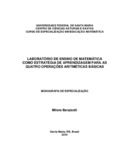| dc.contributor.advisor | Fajardo, Ricardo | |
| dc.creator | Barazzutti, Milene | |
| dc.date.accessioned | 2018-06-29T13:00:30Z | |
| dc.date.available | 2018-06-29T13:00:30Z | |
| dc.date.issued | 2010-02-26 | |
| dc.date.submitted | 2010 | |
| dc.identifier.uri | http://repositorio.ufsm.br/handle/1/13618 | |
| dc.description | Monografia (especialização) - Universidade Federal de Santa Maria, Centro de Ciências Naturais e Exatas, Curso de Especialização em Educação Matemática, RS, 2010. | por |
| dc.description.abstract | Face the change arising when a student passes from the second to the third
cycle of Middle School, one may ask: the concepts studied initially in the Elementary
School may be considered as understood and fully grasped for all students who have
passed on to the fifth grade? Considering, in particular, the teaching of Mathematics,
one observes that, during this process of change, the use of manipulatives is left behind
for the sake of abstraction. Thus, considering that in the Laboratory Method for
Teaching Mathematics (LMTM) exists a variety of manipulatives such as games involving
mental calculation, logical reasoning and abstractions, it is valid to ask: why
not use these materials also in the final grades of Middle School? Perhaps, is it so
due to the lack of knowledge on how to use such materials? Better yet, what would
be the actual influence in the use of such manipulatives when applied to the construction
of some concepts, by the student, regarding a certain mathematical object?
Thus, the present study constitutes, initially, as a reflection on “how” to teach, more
specifically in the case of the LMTM used as a strategy to learn the four basic arithmetic
operations in the fifth grade of the Middle School, as well as its influence in the
teaching process. To search for possible answers to the above questions the research
work was divided in two intertwine parts: one theoretical based on the available
literature, the other practical based on a case study with the participation of students
from the Colégio Estadual Edna May Cardoso, Santa Maria/RS. The research
development, looking beyond the strategies for teaching, allowed relevant considerations
regarding the school social functions and the role of the school mathematics in
the formation of individuals. | eng |
| dc.language | por | por |
| dc.publisher | Universidade Federal de Santa Maria | por |
| dc.rights | Acesso Aberto | por |
| dc.rights | Attribution-NonCommercial-NoDerivatives 4.0 International | * |
| dc.rights.uri | http://creativecommons.org/licenses/by-nc-nd/4.0/ | * |
| dc.subject | Laboratório de ensino de matemática | por |
| dc.subject | Matemática escolar | por |
| dc.subject | Ensino e aprendizagem | por |
| dc.title | Laboratório de ensino de matemática como estratégia de aprendizagem para as quatro operações aritméticas básicas | por |
| dc.title.alternative | Laboratory teaching of mathematics as a strategy for learning four basic arithmetic operations | eng |
| dc.type | Trabalho de Conclusão de Curso de Especialização | por |
| dc.degree.local | Centro de Ciências Naturais e Exatas | por |
| dc.degree.specialization | Educação Matemática | por |
| dc.description.resumo | Diante de todas as mudanças que surgem com a passagem do segundo para
o terceiro ciclo do Ensino fundamental, cabe a pergunta: os conceitos estudados nas
séries iniciais podem ser considerados consolidados para todos aqueles que chegam
à 5ª série? Pensando especificamente no ensino da Matemática, percebe-se
que, nesta etapa, o uso de materiais manipulativos é abandonado em nome da abstração.
Assim, considerando que em Laboratórios de Ensino de Matemática há tanto
materiais manipulativos, quanto jogos que se utilizam do cálculo mental, raciocínio
lógico e abstrações, vale perguntar: por que não utilizar tais materiais também nos
anos finais do Ensino fundamental? Talvez pela falta de conhecimento sobre como e
para que utilizar tais materiais? Ou ainda, sobre qual a real influência, do uso de tais
materiais, na construção de significados pelos estudantes para certos objetos matemáticos?
Assim, o presente estudo se constitui, inicialmente, como uma reflexão sobre
o “como” ensinar, especificamente, no caso do uso do LEM como estratégia de
aprendizagem das quatro operações aritméticas básicas, na 5ª série do Ensino fundamental
e sobre sua influência na aprendizagem. Para buscar possíveis respostas
aos questionamentos apresentados, o desenvolvimento da pesquisa foi dividido em
duas partes interdependentes: uma teórica baseada em estudos bibliográficos e outra
prática baseada em um estudo de caso, com a participação de estudantes do
Colégio Estadual Edna May Cardoso, Santa Maria/RS. O desenvolvimento do estudo,
para além do foco em estratégias de ensino e aprendizagem, permitiu importantes
reflexões acerca das funções sociais da escola e o papel da Matemática escolar
na formação dos sujeitos. | por |
| dc.publisher.country | Brasil | por |
| dc.publisher.initials | UFSM | por |
| dc.subject.cnpq | CNPQ::CIENCIAS EXATAS E DA TERRA::MATEMATICA | por |
| dc.publisher.unidade | Centro de Ciências Naturais e Exatas | por |



